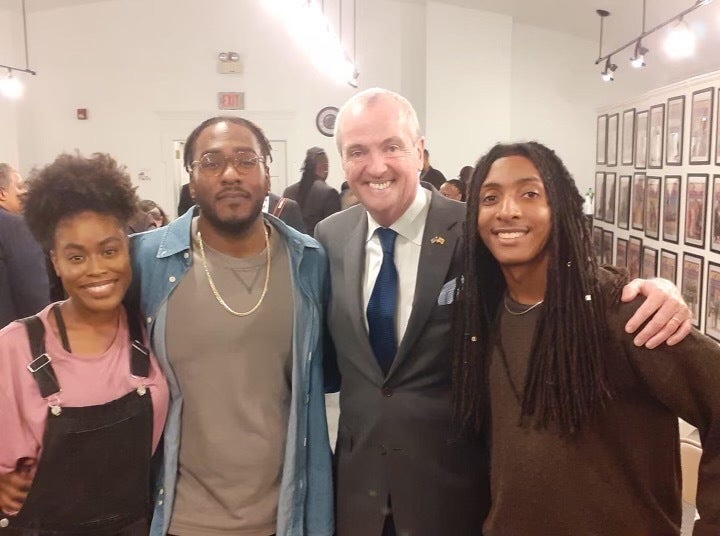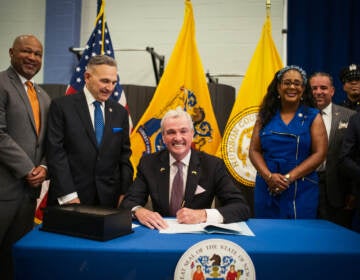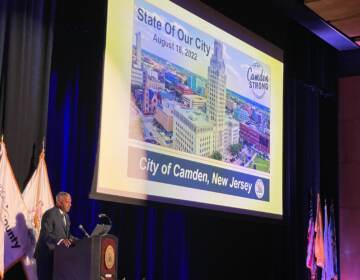Camden activists label $200 million in new state aid the ‘bare minimum’ of need
Murphy said the money would be used to create affordable housing and enhance policing efforts, among a dozen more initiatives.

Ayinde Merrill (second from the left) said he met with Gov. Phil Murphy in 2019. Also pictured Camile Wilson (left), Gov. Murphy (second to right), and Reet Starwind (right). (Courtesy Ayinde Merrill)
New Jersey Gov. Phil Murphy traveled to Camden on Wednesday where he announced more than $200 million in state aid to South Jersey’s largest city and the surrounding area.
Surrounded by local and county officials at City Hall, Murphy said the money would be used to create affordable housing and enhance policing efforts, among a dozen more initiatives.
While much of the funding comes from the current state budget that Murphy signed last month, he said his administration rolled over $24 million from the state’s previous budget for direct aid to Camden.
“These are vital funds that will help the mayor and the city council undertake upgrades to city hall to make it more accessible and responsive to the needs of Camden’s residents,” Murphy said. “They will allow for further investments in the work of the Metro Police Department to make Camden’s neighborhoods safer”
The Governor’s Office provided a snapshot of how the funds are allocated:
- $35 million to demolish vacant structures through the Camden County Improvement Authority
- $15 million for the Camden County Courthouse Regional Corrections Center
- $10 million for Camden County’s work to rehabilitate Admiral Wilson Boulevard West
- $10 million for Camden County’s Park and Trails Program
- $5 million for the Camden Housing Fund Initiative to construct affordable housing
- $5 million for citywide improvements for pedestrian safety
- $4.085 million for sewer and water infrastructure upgrades
- $3 million for upgrades to city hall and city facilities
- $3 million for upgrades to the Metro Police Department
- $10 million for road paving and upgrades
- $2 million for Department of Public Works equipment
- $2 million for illegal dump site remediation
- $2 million for Camden Works to develop a pilot shuttle-bus program for city workers
- $600,000 for social services provided by Joseph’s House of Camden for homelessness initiatives
“It’s an investment in our people,” Camden Mayor Victor Carstarphen said. “It helps breed confidence in our community. It helps breed trust in our community. And it helps build a foundation, a legacy for our children for years to come.”
According to the U.S. Census Bureau, Camden is a predominately Black and latino city, where the median household income is only $28,000, and the median value for homes is $82,000.
Both figures are well below state medians of $85,000 and $342,000, respectively.
Furthermore, 30% of city residents live below the poverty line.
Ayinde Merrill, an activist and proud Camden resident, said he’s happy to hear about the infusion of cash into the city, especially for street improvements and sewer upgrades, but he said he wasn’t fully impressed by Murphy’s visit on Wednesday.
“I don’t think they need a press conference to talk about streets and city hall improvements … it’s the bare minimum,” Merrill said.

The 27-year-old organizer challenged state leaders to do more to make the city more affordable and to lift residents out of poverty.
“If the state is going to assist the city, it’s finding out how to get Camden residents jobs that pay a livable wage,” he said. “I thought that was absent and that there can be a lot more room for improvement.”
Merrill, who said he spoke briefly with Governor Murphy in 2019 about Camden’s quality of life, said he and several other organizers in the city are working on creating a referendum that would require private corporations with 25 or more full time employees to report each year on how many local residents they hire.
“If we’re able to find that out, we can also find out who’s not working, why they’re not working, and then start to frame, how do we then address who’s not working?” Merrill said.
WHYY is your source for fact-based, in-depth journalism and information. As a nonprofit organization, we rely on financial support from readers like you. Please give today.








